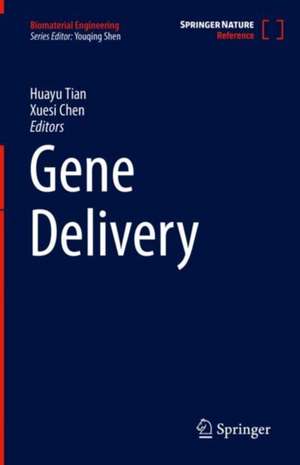Gene Delivery: Biomaterial Engineering
Editat de Huayu Tian, Xuesi Chenen Limba Engleză Hardback – 29 apr 2022
Gene therapy has been regarded as a great potential for specific treatment of gene-related human diseases, such as cancer, genetic and epidemic diseases. Gene therapy refers to the biomedical technology that inserts normal or therapeutic exogenous genes into target cells to repair or replace defective genes in target cells, so as to achieve the purpose of treating diseases. Efficient gene delivery systems are the crucial roles for successful implementation of gene therapy. This book provides a platform for young scholars and students to systematically understand the preparation and characterization of the existing non-viral gene delivery systems, as well as providing a technology platform for clinical gene therapy
Preț: 2615.21 lei
Preț vechi: 2752.86 lei
-5% Nou
Puncte Express: 3923
Preț estimativ în valută:
500.44€ • 524.88$ • 416.59£
500.44€ • 524.88$ • 416.59£
Carte tipărită la comandă
Livrare economică 28 martie-03 aprilie
Preluare comenzi: 021 569.72.76
Specificații
ISBN-13: 9789811654183
ISBN-10: 9811654182
Pagini: 565
Ilustrații: XXIII, 565 p. 233 illus., 60 illus. in color.
Dimensiuni: 155 x 235 mm
Greutate: 1.23 kg
Ediția:1st ed. 2022
Editura: Springer Nature Singapore
Colecția Springer
Seria Biomaterial Engineering
Locul publicării:Singapore, Singapore
ISBN-10: 9811654182
Pagini: 565
Ilustrații: XXIII, 565 p. 233 illus., 60 illus. in color.
Dimensiuni: 155 x 235 mm
Greutate: 1.23 kg
Ediția:1st ed. 2022
Editura: Springer Nature Singapore
Colecția Springer
Seria Biomaterial Engineering
Locul publicării:Singapore, Singapore
Cuprins
Overview on gene therapy.- Cationic liposome.- Functionalized peptide dendrimers.- Bioresponsive poly(amido amine)s.- Cationic polyphosphoesters.- Polysaccharide-based gene carriers.- Polypeptide-based gene carriers.- Fluorinated gene carriers.- Target gene delivery systems.- Cationic helical polypeptides.- Cyclic cationic polymers.- Cationic bolaamphiphile.- Chitosan-functionalized gene carriers.- Charge-reversal gene carriers.- Multifunctional envelope-type nanodevice.- Drug and gene co-delivery systems.- Oral delivery of gene therapy.- Gene therapy for brain diseases.
Notă biografică
Huayu Tian Prof. Tian is currently a professor at Changchun Institute of Applied Chemistry, Chinese Academy of Sciences, Jilin, China. Prof. Tian was born in 1977 in Nanyang, China. He obtained his bachelor’s (1998) and master’s (2000) degrees from Harbin Institute of Technology, and PhD degree from Changchun Institute of Applied Chemistry (CIAC), Chinese Academy of Sciences (CAS), in 2006 (supervised by Prof. Xuesi Chen). From 2006 to 2012, he worked at Changchun Institute of Applied Chemistry as an assistant professor and associate professor. He was a visiting scholar at the University of Utah from 2009 to 2010. Prof. Tian was appointed as a full professor at Changchun Institute of Applied Chemistry in 2012. In 2014, he was supported by the National Program for Support of Top-Notch Young Professionals. In 2019, he was supported by the National Science Fund for Distinguished Young Scholars of China. Prof. Tian’s research interests include design and synthesis of biomedical polymer materials, polymeric gene/drug intelligent delivery systems, polymeric nanocarriers for nucleic acid diagnosis and therapy, polymeric nanocarriers for tumor immunotherapy, and development of materials for bio-manufacturing. He has published more than 160 peer-reviewed scientific articles and holds more than 50 China invention patents. Currently, he is the deputy general secretary of the Biomedical Polymer Materials Branch of the Chinese Society of Biomaterials and chairman of the Jilin Provincial Testing Society.
Xuesi Chen Prof. Chen is currently a professor at Changchun Institute of Applied Chemistry, CAS, Jilin, China. Prof. Chen was born in 1959 in Changchun, China. He obtained his bachelor's degree from the Department of Chemistry at Jilin University in 1982; master’s degree from Changchun Institute of Applied Chemistry (CIAC), Chinese Academy of Sciences (CAS), in 1988; and doctoral degree from Waseda University in 1997 (supervised by Hiroyuki Nishide). After postdoctoral study at the University of Pennsylvania, he joined the faculty at CIAC as a professor in 1999. In 2009, he was made the vice director of the academic committee of Key Laboratory of Polymer Ecomaterials, CAS. In 2004, he was supported by the National Science Fund for Distinguished Young Scholars of China. In 2012, he was made the vice director of the academic committee of CIAC, CAS. In 2013, he was the recipient of the “Ten-thousand Talents Program” and the Science and Technology Innovation and Entrepreneurship Talents. In 2016, he was elected to be the Fellow of Biomaterials Science and Engineering. In 2019, he was elected to be the academician of the Chinese Academy of Sciences. Prof. Chen’s research interests include synthesis of Schiff base catalysts for ring-opening polymerization of lactides, preparation of biodegradable polymers for biomedical applications such as bone fracture repair, drug and gene carriers, hydrogels, and industrialization of polylactide (PLA) as greenplastics. He has authored or co-authored more than 800 papers with an H-index of 99 (total citations more than 37,000 times). He is also the holder or coholder of more than 310 Chinese invention patents and 1 US-authorized patent. Currently, Prof. Chen is board member of Advanced Healthcare Materials, the Journal of the Controlled Release, Biomacromolecules, and Acta Biomaterialia, among others.
Textul de pe ultima copertă
Gene delivery is a promising strategy for the specific treatment of numerous gene-associated human diseases by intentionally altering the gene expression in pathological cells. A successful clinical application of gene-based therapy depends on an efficient gene delivery system. Many efforts have been attempted to improve the safety and efficiency of gene-based therapies. Nanoparticles have been proved to be the most promising vehicles for clinical gene therapy due to their tunable size, shape, surface, and biological behaviors. In this volume, the recent developments of nanoparticles for clinical gene therapy will be identified and summarized.
Caracteristici
Serves as an everyday reference for scientists, practitioners and students in gene delivery Presents recent developments of nanoparticles for clinical gene therapy Employs a systematic approach offering readers an user friendly reference ideal for frequent consultation

